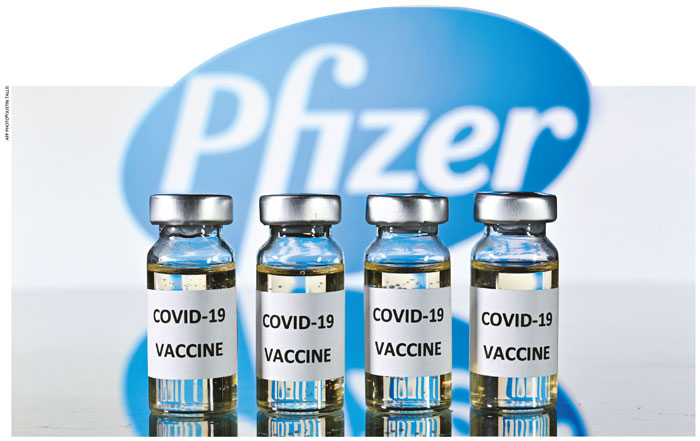COVID-19 VACCINES
HOPE IS ON THE HORIZON
Saro Thiruppathy discusses the types of COVID-19 vaccines that will soon be available
When the WHO declared that COVID-19 was a pandemic, the world shook and then went still for several months. Countries went into lockdown, economies suffered, and the health and wellbeing of nations plummeted as a result of the rapid spread of SARS-CoV-2, which is the virus that’s responsible for this havoc.
People were desperate. They were confined to their homes, some lost their jobs, and many were depressed because they couldn’t see a light at the end of a tunnel of loneliness and despair. Then good news appeared on the horizon as pharmaceutical companies began announcing the discovery of vaccines that would protect people from COVID-19.
The FDA has granted approval for the Pfizer-BioNTech vaccine to be administered in the US and t he UK began administering it to vulnerable groups in early December.
he UK began administering it to vulnerable groups in early December.
Meanwhile, the UAE has approved China’s Sinopharm vaccine despite its relatively low 86 percent efficacy. And the list of countries and orders is increasing rapidly.
PHASED TRIALS In order to understand what’s happening in relation to vaccines, it’s necessary to know what they’re made of and who’s at the front of the line seeking approval from health regulators around the world.
Different phases of the trials must be conducted before manufacturers can obtain approval. The preclinical testing stage is when the new vaccine is applied to animals to see if it triggers an immune response. Phase 1 safety trials are conducted by vaccinating a small number of people to test dosage and safety, and check whether it activates the immune system.
Next is Phase 2 with expanded trials where hundreds of volunteers are placed in groups according to their age to study the impact of the vaccine on age, as well as its safety and ability to elicit a response from the immune system.
During Phase 3 trials, thousands of people are injected to see how many may get infected in contrast with the volunteers who were given placebos. It’s also possible to uncover evidence of side effects that may have been missed during the previous trials.
The US Food and Drug Administration (FDA) has informed manufacturers that they must furnish evidence, which shows the vaccine is capable of protecting at least half the tested groups.
Due to the prevailing situation, it’s possible that other vaccines too may receive Emergency Use Authorization from the FDA – even before formal approval has been granted.
Some vaccine makers in Russia and China have received approval from their governments without submitting the results of Phase 3 trials. Eventually, regulators will need to review the result of the trials and decide whether to approve the use of the vaccine in their countries or not.
VACCINES TYPES Currently, many types of COVID-19 vaccines are being developed around the world. Genetic vaccines contain one or more coronavirus genes, which are introduced into human cells to promote an immune response.
Moderna and Pfizer-BioNTech are the leading companies using technology that involves a genetic molecule known as messenger RNA (mRNA).
According to the US Centers for Disease Control and Prevention (CDC), mRNA instructs the cell to make a piece of the spike protein that’s unique to SARS-CoV-2. Since only part of the protein is made, it’s not harmful and stimulates an immune response in the body.
Viral vector vaccines are engineered to carry coronavirus genes. These vaccines will use non-replicating viral vectors that will infect the cells and insert their genetic material including the antigen gene into the nuclei of the cells.
Oxford University-AstraZeneca, Chinese firm CanSino Biologics and Sinopharm, as well as Russia’s Gamaleya Research Institute, are among the manufacturers to have completed Phase 3 trials using this technology.
In the case of protein-based vaccines, a spike protein is extracted from the coronavirus that’s either alive or inactivated, then purified and injected as vaccine. There’s no genetic material transferred. The University of Queensland is one of the institutions engaged in developing a protein-based vaccine.
Other types of COVID-19 vaccines being trialled are inactivated or attenuated coronaviruses, as well as repurposed vaccines such as
the one against tuberculosis.
Transporting these vaccines around the world will be extremely difficult since some of them have to be stored at very cold temperatures and moved with care in special boxes. The Pfizer-BioNTech vaccine has to be stored at minus 70ºC and Moderna requires minus 20ºC but the Oxford University-AstraZeneca vaccine doesn’t need extremely cold storage.
COVAX FACILITY The WHO together with Gavi – The Vaccine Alliance, UNICEF etc. – have established a global initiative known as COVAX to ensure that developing nations will have equitable access to COVID-19 vaccines. Sri Lanka is one of the participating countries in this initiative.
The Director General of the World Health Organization Dr. Tedros Adhanom Ghebreyesus recently cautioned the world against hoarding vaccines when he said that “the light at the end of the tunnel is growing steadily brighter but vaccines must be shared equally as global public goods and not as private commodities that widen inequalities, and become yet another reason that some people are left behind.”






Leave a comment